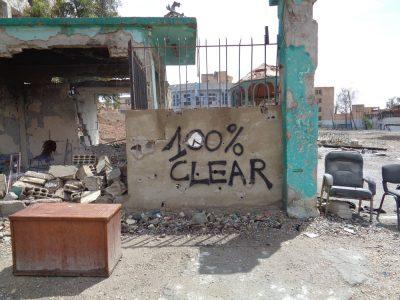
Raqqa city is a ‘minefield’ as clearing efforts expected to take months
Two weeks after US-backed forces captured Raqqa from the Islamic State, the city lies in ruins, strewn with mines as early reconstruction efforts get underway, while thousands of displaced residents wait to return.
Months of battle and bombings shattered Raqqa city’s infrastructure, leaving most of it uninhabitable for thousands of people now trapped outside their home city, says Firas Mamdouh al-Fahd, a member of the Raqqa Civil Council.
“The city lacks the most basic services: water, electricity, a sewage system,” al-Fahd told Syria Direct. “Many buildings that were not destroyed are still liable to collapse.”
The Raqqa Civil Council is a body established by the United States-backed Syrian Democratic Forces (SDF) this past April to administer the city once it was captured from the Islamic State. The council is overseeing the city’s reconstruction, by all accounts a monumental task.
Underneath piles of rubble, bodies still lie, unburied and rotting, says al-Fahd. “We’re sending out teams of coroners to deal with the bodies,” he says. “Civilians cannot be allowed to return until these corpses are buried, because of the risk of illness and disease spreading.”
One of the most pressing challenges ahead is the presence of scores of IEDs and landmines spread throughout the city, al-Fahd and other sources directly involved in the reconstruction effort told Syria Direct this week. According to the US-led coalition, IEDs killed members of at least nine civilian families who attempted to return to the city in recent weeks.
“The city is a minefield,” the Raqqa Civil Council said in a post on its official Facebook page on Monday.
“We are working with a number of organizations to remove the mines, rubble and earthen fortifications,” Abdelghafar, an engineer on the Raqqa Civil Council’s Reconstruction Committee told Syria Direct on Tuesday. “This is the first stage to pave the way for families to safely return to their homes.”
The SDF, a multi-ethnic coalition primarily comprised of a Syrian Kurdish fighting force, launched the battle for Raqqa city on June 6 with the backing of US-led international coalition warplanes, artillery fire and advisers on the ground.
During the more than five month battle for Raqqa, the US-led coalition dropped some 20,000 munitions on the city, according to the UK-based international monitor Airwars. Artillery fire and sniper bullets tore through flesh, pockmarked the sides of buildings, the walls of bedrooms, and street signs. Landmines and IEDs planted by Islamic State fighters killed civilians trying to flee the encircled, embattled city. An estimated 1,800 Raqqa civilians died over the course of the fighting, Airwars reported.
The SDF captured the city on October 17, trading the city’s black flags for yellow ones as the picture of Abdullah Ocalan—the ideological leader of the Kurdish militia making up the bulk of the forces—went up in Raqqa’s central square during celebrations.
Virtually all of Raqqa’s residents—some 300,000 people—fled prior to or during the battle. Outside the empty city, its residents now wait to return to their homes—in displacement camps, in the houses of relatives, or crowded into rented rooms. Many do not know if they have anything left to go back to, said one Syrian journalist who has been visiting the displacement camps.
“Displaced people are torn up about the destruction of their city and their homes,” journalist Abood Hamam told Syria Direct from the Raqqa countryside. “I saw some people sleeping out in the open with their belongings, especially the most recent arrivals.”
The ubiquitous landmines and the time needed to remove them means that many civilians will be trapped outside their city, crowded in camps throughout the winter.
“The city cannot be fully cleared of mines before March or April of next year,” said al-Fahd. Residents of Raqqa are to be allowed to return on a district-to-district basis, as each is declared free of landmines and rubble removed from the streets.
“Six months is a long time,” said journalist Abood Hamam, currently in the Ain Issa camp north of Raqqa city, “especially with winter coming.”
For its part, the US-led coalition—which is currently providing training for minesweepers, heavy machinery to move rubble and other logistical support—says it has “not identified a hard timeline” but would work with partners “to enable the citizens to move back as soon as it is safe for them to do so.”
A spokesperson for the coalition told Syria Direct on Wednesday that the US-led force is supporting local efforts to rebuild, but that it has “no defined role in reconstruction” and would “remain focused on our mission to defeat Daesh in Syria and Iraq.”
Source: Syria Direct





